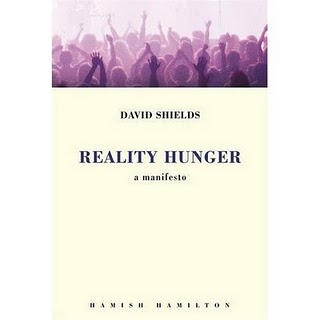Reality Hunger: A Manifesto
By David Shields
Hamish Hamilton
David Shields’s Reality Hunger: A Manifesto, as its title suggests, is meant to be an aesthetic call to arms. Shields argues that the most interesting contemporary works of art, music, literature, film and television are those that attempt to introduce more ‘reality’ into their composition by including autobiography, memoir, documentary evidence or appropriating already-existing material. This desire for the authentic, which he terms ‘reality hunger’, is a result of the increasingly artificial notion of the world around us in modernized capitalist societies. Reality Hunger formally employs its own principles: the majority of the text is not actually Shields’s own writing, but instead comprises quotations from other authors that he has cut and re-appropriated into the book, which he likens to the process of sampling music.
As its subtitle states, the work is a manifesto. Manifestoes typically employ the agit-prop techniques of political radicalism, and Reality Hunger is no exception; many of Shields’s statements are intended to be provocative and to shock the reader. But on this score he isn’t very successful. Most of Shields’s arguments (that memoir is a genre that has legitimate literary merit, that what we presume to call ‘reality’ is in many ways itself an artificial construct, and that copyright law no longer reflects the use of intellectual property in the age of the internet) will be familiar to anyone who has ever taken an undergraduate course in postmodern theory or media studies. Ultimately, many of his assertions come off as basically banal.
At other points, his logic is either confused or faulty; Shields compares sampling in hip-hop to the use of autobiographical material in texts. This is certainly incorrect. Sampling is much closer to the process of allusion, or referencing other texts, which has been used in literature for centuries from Shakespeare (who based many of his plays on other stories) to T.S. Eliot’s The Waste Land. Moreover, Shields does himself a disservice by placing his own writing next to quotations from other, ultimately superior authors; the contrast between the prose styles doesn’t tally in his favour. The nadir of the book occurs when Shields quotes Kurt Cobain in an attempt to seem in touch with the culture that ultimately feels ham-fisted.
That being said, Shields’s arguments about the ways that literary texts can expand their horizons by using real-life material are ultimately very interesting, even if he repeats many ideas already associated with Hunter S. Thompson and Tom Wolfe’s New Journalism (not to mention Truman Capote’s non-fiction novel In Cold Blood). But while Shields’s arguments may offer a description of future works that successfully blend the fictive with reality, Reality Hunger is not one of them.




No comments:
Post a Comment